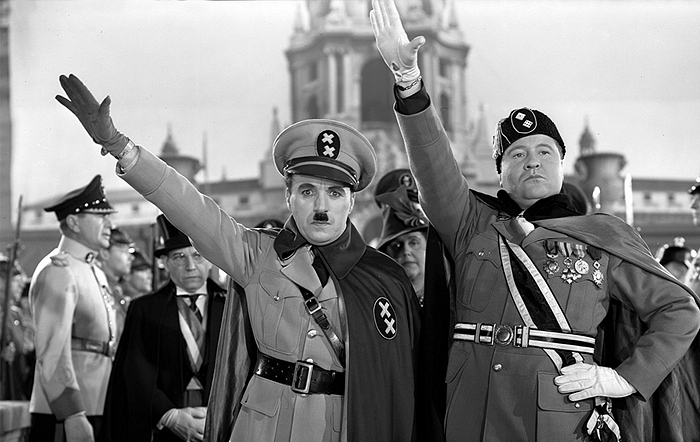
Wir tanzen Ado Hynkel / Benzino Napoloni - Laibach, "Tanz Mit Laibach"
Throbbing Gristle. The Great Dictator. David Bowie's Thin White Duke. The Producers. Hanzel und Gretyl. Fascists on Mars. The gangly, elastic-limbed John Cleese goose-stepping around the Fawlty Towers lobby to the dismay of his German guests. Allo Allo, a vastly inferior British comedy from the same period. That one Killing Joke compilation with the priest blessing the brownshirts, who salute him in turn, on the cover.
The desire to riff on the absurdity of Nazism and fascism has been around almost long as the ideologies themselves have, usually - but not always - being accepted as a way of dealing with the sheer horrors that took place. Where an artist - an actor, a writer, a musician - might run into trouble is when the goose-stepping and toothbrush-moustaching becomes a means to deliver a serious political point rather than mere comic relief.
And Disciplinatha were anything but a comedy act. The uniforms, the slogans and the Mussolini samples may have been provocative stunts, but the seething anger behind their music was genuine. "Nazioni", from the Crisi di Valori 12" (1991), reduces Ode to Joy (the EU's official anthem) to a tinny, ridiculous-sounding Christmas card jingle and, through a projectile-vomited industro-thrash diatribe, lays bare exactly what the band thought of a new European order in which the Axis Powers, with the notable exception of Italy, were once again calling the shots:
"Teutonic order / Sacra Corona Unita / socialist dukedoms / 80 million rich, fat Germans / Japan and Germany are stronger than ever"
One gets the impression that Disciplinatha saw Italy as being constantly under occupation by one foreign power or another - be it the Austrian Empire in the 19th Century, Nazi Germany in the 1940s or the USA (or the USSR, in Emilia-Romagna's case) during the Cold War. That is not to say that Disciplinatha were nationalists expressing wounded national pride. If anything, they were nihilists expressing a bitter national disgust in a modern, neutered and neutral Italy with no national character of its own, no noble cause to rally around or great patriotic spirit to instil pride in its subjects.
From the sharps bin of history, Disciplinatha pulled out the dirty needles of fascism - the last identity Italy wholly embraced, willingly or otherwise - and, brandishing them like a knuckleduster, snarled "is this the best that we, as a country, can do?" at a passive, comfortably apathetic people who were simply content with no longer being at war.
"There was this idea that, ok, fine, we are fascists, we're the absolute greatest evil, it's not open for debate. So, from down here in the shit, we will judge you, the good guys." - Parisini
Whatever Mussolini was waiting for when he made that infamous "Abbiamo pazientato 40 anni..." ("We've been patient 40 years...") speech, we can take an educated guess at what Disciplinatha had been waiting for. Forty years earlier, the Christian Democrats stole the election from the popular left front. A few years prior, the Allies had liberated Italy. In 1988, Disciplinatha and their generation were still waiting for the democracy and liberty that had been promised to their parents but never quite materialised, and for America to stop interfering in their country's affairs.
The unacceptable face of freedom
"Punk was dead and we needed to find a new way to be antisocial. And one way to do this was to wear uniforms. You had your metalheads, your goths, your punks, your post-punks and your paninari...everyone had a uniform. We wanted uniforms of our own. " - Parisini
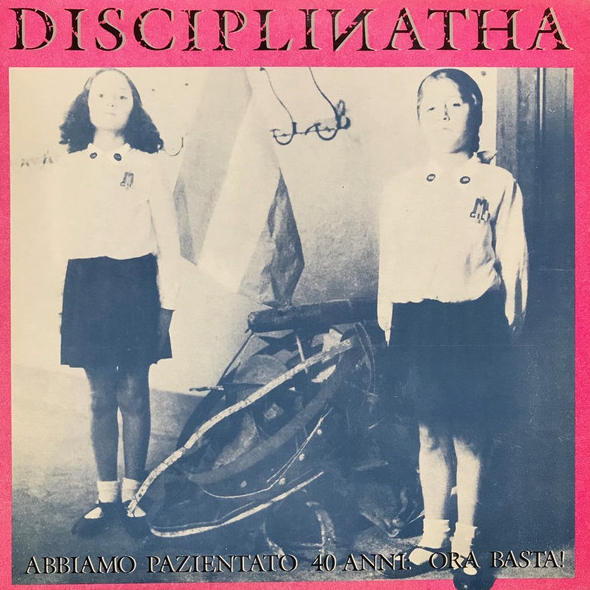
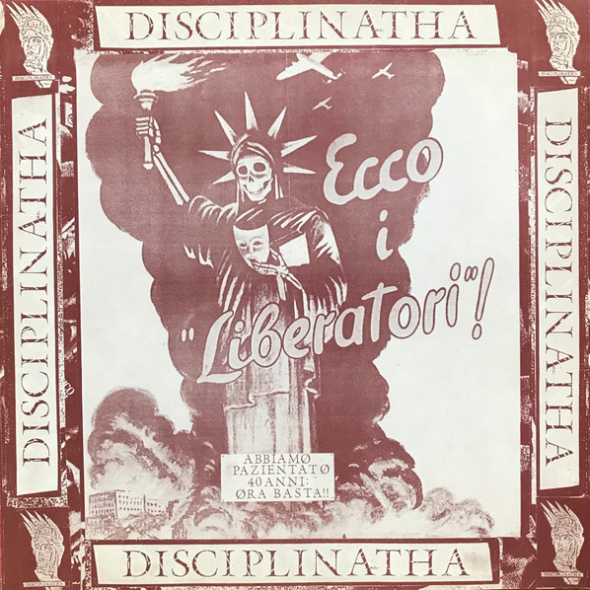
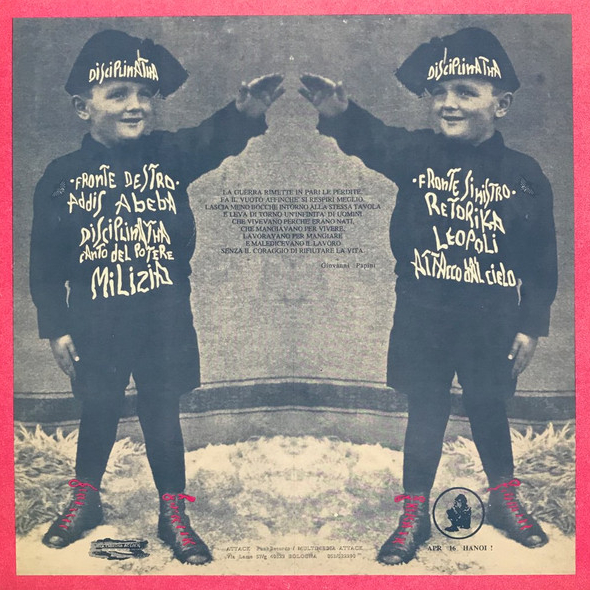
Abbiamo Pazientato 40 Anni: Ora Basta! (Attack Punk Records, 1988)
There's a lot going on here, on the sleeve of Disciplinatha's debut album, and most of it is pretty disturbing to say the least. You know the Roman salute means trouble even if you're not well-versed enough on the finer points of the Ventennio to recognise that the kids on the front and back cover are members of two fascist youth organisations, the Piccole Italiane (or possibly Giovani Italiane, depending on their age) and the Balilla respectively. On closer inspection, it gets even worse: the boys have had their laces coloured red in post-production, allegedly Doc Martens wearer code for an inclination towards violence, usually of a racialised kind.
Capping it all off is a quote from poet Giovanni Papini, who described war as a "Malthusian operation", as a great equaliser that relieved the strain on resources. If you came here from part one hoping for closure on the eternal question of "Were Disciplinatha fascists?" then, well, I'll be the first to admit it's not looking good.
"They knew to bring out exactly the wrongest possible aesthetic at exactly the right time." - Sergio Messina, musician and Disiplinatha fan
The liner notes thank a bizarre and contradictory assortment of characters. Disciplinatha tip their hats to the (West German, not British) RAF and the SPK (the Australian industrial band or the Socialist Patients' Collective? Both, probably). Francesca Mambro and Gianfranco Faina - neofascist terrorist involved in the Bologna station massacre, and left wing political prisoner respectively - both get a shout out.
There are mentions of both Louis-Ferdinand Céline and Public Enemy. There's Peter Sotos, Ned Kelly, Ezra Pound...a real mixed bag of folk heroes and irredeemable scum. Some of the "characters" are, in fact, fictional - like Snake Plissken or Luke Cage.
Oh, and then there's the "Me Ne Frego" t-shirts Disciplinatha were fond of wearing. Face-value promotion of a fascist slogan or clever punk subversion? That a fascist slogan could so easily be co-opted by a punk band says as much about punk as it does about fascism.
"We're not on the right - in fact, we're good people." - irony-laden inscription on the back of a Disciplinatha record

"Satire requires a clarity of purpose" etc etc
Disciplinatha were a lot smarter than your average punk band, however. Asking Sid or Siouxsie why they chose to wear swastika armbands would be akin to asking babies why they soil themselves. What Disciplinatha presented to the world was closer to the layered, wilfully ambiguous performance art of Slovenian industrial warlords Laibach than any art school dropout tantrums being thrown in the punk world.
It's not Laibach's fault Queen's lyrics sound fascistic when sung in German.
If Disciplinatha's aim was to parody totalitarianism à la Laibach, then they went about it with far heavier hands than the then-Yugoslavian quartet did, but they still more or less achieved the same aim. I would argue, however, that their aim wasn't purely to satirise fascism, but to use its aesthetics for shock value, and in the process do what Laibach never intended to do: reveal to the listener what they were actually thinking.
The sound of free speech
"Punk was all about finding the things that weren't beautiful, sweet, correct...punk had the courage to go and stick its fingers in the plug socket to see what would happen." - Helena Velena, Bologna punk scene luminary and Disciplinatha fan
Now, I don't know if we're alone in this, but here at n0teeth we find it impossible to respect an artist who deliberately sets out to provoke a reaction only to whinge about getting a stronger one than they'd bargained for. There is nothing more cowardly than lighting the touchpaper before scampering for safety with your tail between your legs.
Iceage springs to mind: no, not the animated film with the woolly mammoth and the funny little rat-like creature, but the gormless Danish muppets who carefully cultivated a cryptonazi image through Burzum and Death In June flair, KKK hoods and the liberal use of Nordic runes.
Disciplinatha, to their credit, accepted from the word "AVANTI!" that getting burned is an occupational hazard for those who play with fire. And they were playing with fire while the members of Iceage were still in short lederhosen.
Iceage's foibles have been justified as the work of "misunderstood youths playing aggressive music with controversial ways of expressing their art" - as easy as it would be to apply the same faintly patronising logic to Disciplinatha, I credit the Italian band with knowing exactly what they were saying, and having the agency to keep saying it even under a hail of glass bottles.
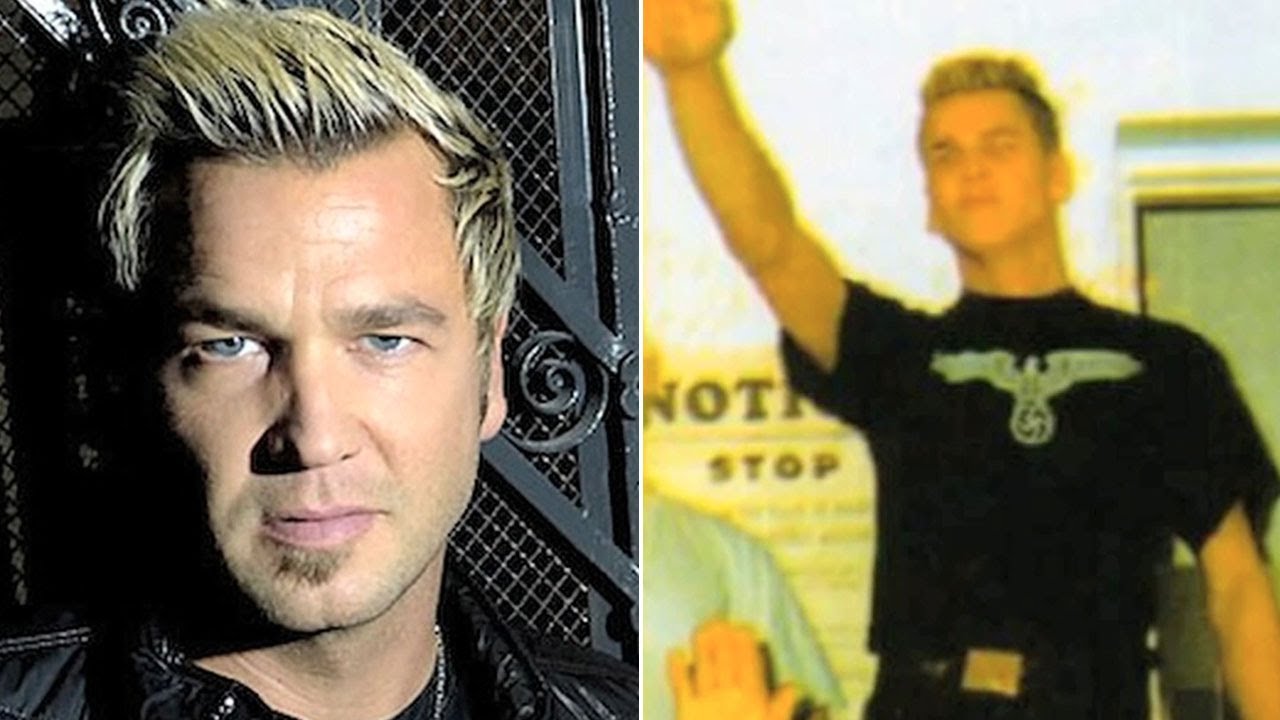
Another Scandi rock musician with fermented herring for brains.
The intention of this piece was neither to cancel Disciplinatha nor rehabilitate them. How can a blog post written in English affect the reputation of a band that doesn't even have any kind of reputation whatsoever outside of Italy?
Rather, n0teeth is exercising the same right to free speech Disciplinatha had, to question, criticise and - should I see fit - insult their art and its motivations (and insult it I will, when we get to their third, final and worst album).
L'Italia s'è desta
"We were a left wing group using right wing symbols. It turns out that wasn't allowed!" - Santini
Quotes like the above are an unconvincing attempt at retconning the Disciplinatha story. Not being fascists doesn't necessarily mean Disciplinatha were left wing. They did, however, play almost exclusively in left wing spaces, never once becoming absorbed into Italy's skinhead subculture - possibly because they were simply too Italian for a scene that felt more affinity with Britain and Germany, the countries that bombed and occupied Italy, respectively.
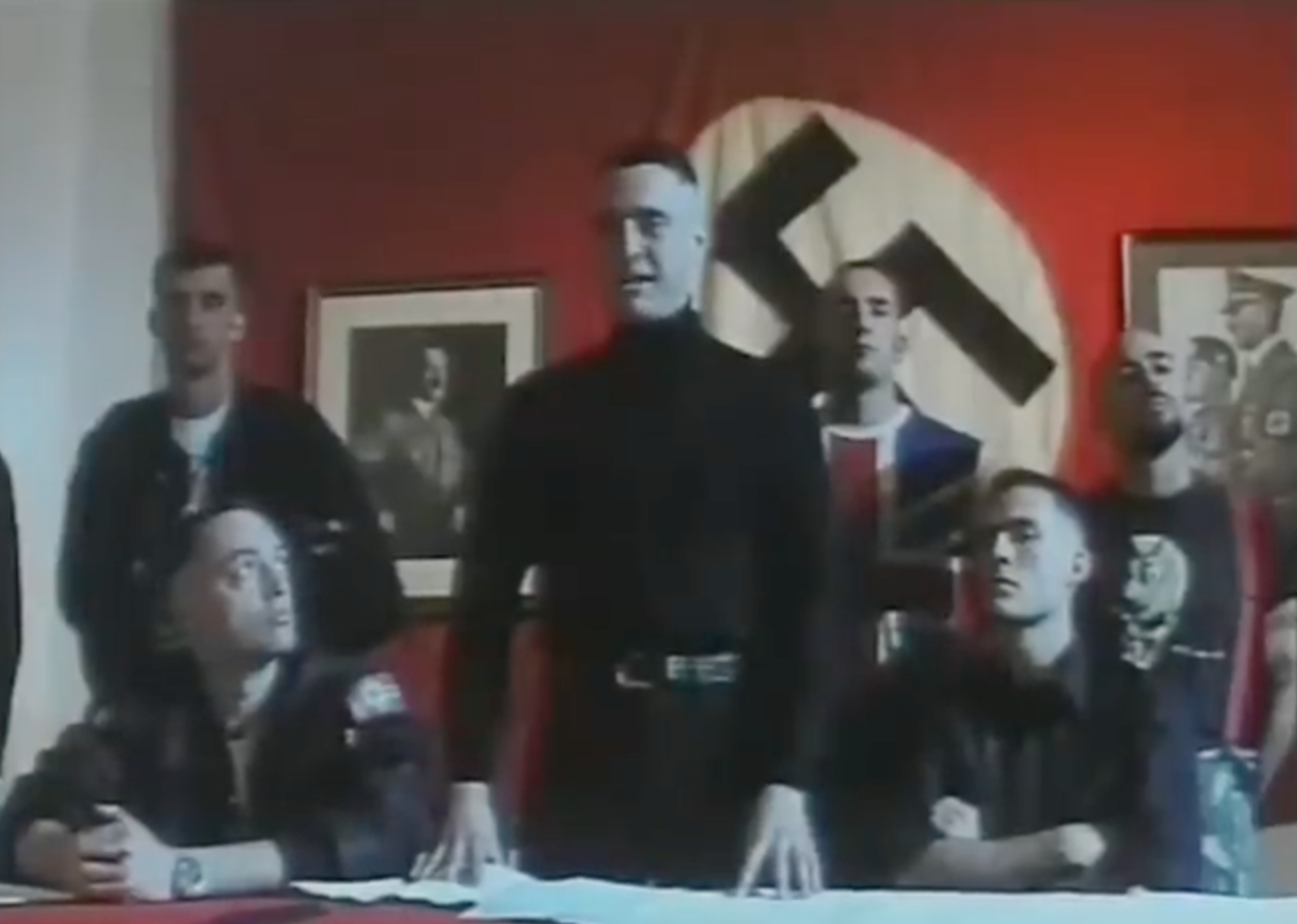
A still from Teste Rasate ("Skinheads", 1993). Not a tricolore in sight, just Anglo-Teutonophile Roman neo-Nazis enjoying the moment.
Questions of Italian identity are as crucial to Disciplinatha as they are to Adriano Celentano, Gianna Nannini, Fabri Fibra or even CCCP, for that matter. The norms and conventions they rejected were first and foremost Italian ones.
"We didn't give a fuck about going to London to see the sights, to see the bands. We'd go to Predappio [Mussolini's hometown]...we'd get high in the abandoned fascist heliotherapy resort on the river Reno." - Parisini
When a British band evoked the grim spectre of Nazism by calling themselves Joy Division, it sent a chill down the collective spine of generations that grew up learning about the Nazis as 20th century Europe's ultimate evil - a sprawling, colonising force that attempted to enslave half the world (any resemblance to previous white supremacist Empires is coincidental, of course).
Disciplinatha struck a peculiar nerve by reminding the Italian listener not only of Italy's great evil, but the fact that it was lesser than Germany's, that Mussolini's grand ambitions for world domination were dashed on the Aegean coast like so many poorly-built skiffs. The public's reaction was a good litmus test: were they angry at being reminded of the Italian Empire's crimes, or its failure to expand and commit even worse ones?
We might call Disciplinatha "trolls" or "edgelords" in modern parlance. Back then, they were simply delinquents, or irritants; an unpleasant rash that briefly but unavoidably flared up on the soft, fat, white underbelly of modern Italian society.
You know what else is soft, fat and white?
The art of noise
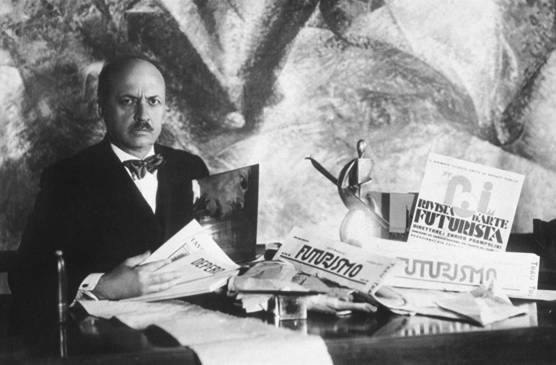
"A roaring motor car which seems to run on machine-gun fire, is more beautiful than the Victory of Samothrace." - Filippo Tommaso Marinetti, Manifesto del Futurismo
Long before punk - decades before Nevermind the Bollocks and the infamous 1976 Thames Television incident in which Bill Grundy dropped his khakis and defecated directly into Garry Bushell's eagerly waiting mouth - a different group of young irritants was declaring war on the institutions of taste, harmony and order.
The Futurists celebrated speed and noise, violence and volume: everything Disciplinatha in its prime was all about. Unlike Disciplinatha, however, there was nothing ambiguous about their political leanings. Ten years after writing the Futurist Manifesto, Marinetti wrote the Fascist one, laying the intellectual and ideological grounds for Mussolini's eventual takeover and brutal 20-year rule of Italy and its bloodily colonised overseas territorial claims.
It has become a cliche to credit Marinetti's fellow Futurist/Fascist Luigi Russolo with inventing industrial music, but one with a basis of truth. An old t-shirt slogan I've seen making the rounds as recently as Sunday afternoon asserts that "England didn't invent punk, girls did". I wonder if there's any mileage in a t-shirt slogan along the lines of "England didn't invent industrial, fascist Italy did" - sadly, with Throbbing Gristle no longer a going concern, I'll never get to test this out on the audience most likely to have a strong reaction to it either way.
Putting aside the lineage of electronic experimentation connecting this composer to that band, that artist to this school or movement, when we're talking about "industrial music" as music that literally sounds like some kind of machinery in action, both the Futurists and Disciplinatha were onto something here.
Marinetti's concrete poem Zang Tumb Tuuum evokes the sound of the war machine through onomatopoeia - exploding artillery shells from the Battle of Adrianople rendered in staccato verbal bursts. Disciplinatha's "Attacco dal Cielo" (Attack from the Sky) achieves a similar effect through Dario Parisini's howling, screeching, (almost literally) dive-bombing guitar work, mimicking the terrifying drone of an air squadron - the Italians over Ethiopia in 1935, the British over Italy in 1943, the Americans over Libya in 1986, the Iraqis over Iran in 1988? - swooping down from the heavens.
Neither of these works condemns or endorses war or militarism. They both simply Are - like raw, unedited news footage from the frontlines (Marinetti was, in fact, working as a war reporter when he was inspired to write Zang Tumb Tuuum). "Attack from the Sky" is just one more munition in Disciplinatha's multi-media assault, which in turn pales in comparison to the synapse-frying, information-overloading multi-media bombardment we are all subjected to every day.
Designer violence
Listen to enough Italo disco (or, as they call it in the old country, Italo) and you're sure to build up an image of Italy in the late 20th century as a happy, carefree, decadent land of milk and honey, of Vespas and skiing holidays, cocaine and Campari sodas, Milan fashion week and the beautiful game.
Disciplinatha, on the other hand, shows you the dark side of the pizza: a vision of Italy as a frighteningly unstable and corrupt narco-state, half governed by the CIA and half owned by an increasingly powerful Milanese businessman whose name I can't even bring myself to type out for fear of my laptop contracting syphillis. An Italy of far right Masonic lodges, antiziganist pogroms carried out by serving police officers and civilians slaughtered on Italian soil by USAF pilots.
In Italy, sensationalist tabloid reporting on crime, especially violent crime, is known as "cronaca nera", or "black news". Disciplinatha provide a kind of cronaca nera in rock n roll form. If we're to take an admittedly rather generous view of their work, they weren't merely out to shock and provoke but to bravely break omertà on what their fellow Italians were afraid to say on tv: the bel paese ain't all that bello.
The truth is not a neutral middle ground between the pictures painted above, but often a bizarre hybrid of the two. For instance, the paninaro subculture - those fashion-conscious Milanese kids who inspired a Pet Shop Boys song - originated in a group of upper middle class neo-fascists who hung around San Babila square, waiting to violently pounce on anyone who "looked" left wing. While the waifs and strays of Disciplinatha shivered through comedowns and withdrawals in their tattered army surplus, the real fascist youth peacocked their way about town in designer silks.
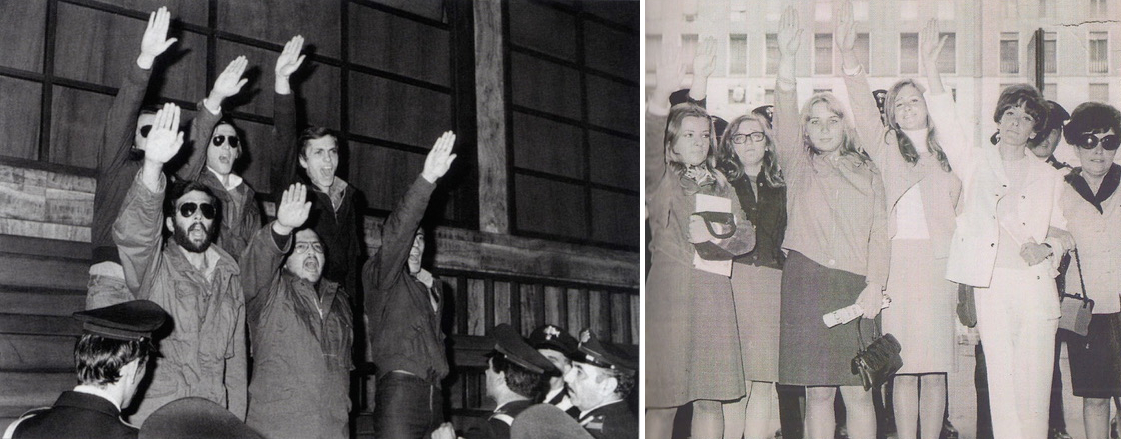
Proto-paninari: some San Babilini and San Babiline in a rare moment when they weren't murdering students. Source: Affari Italiani.
Tu vuò fà l'americano
"If nothing else, Disciplinatha tried to deflate that big hard American dick that was always imposed on us, that dick which was deflated definitively on September 11th." - Graziano Cernoia, sound engineer and Disciplinatha fan
Perhaps the imposition of American culture is partly due to the fact that Italian culture never full de-fascistised itself. In 1983 the teenaged boys who would go on to form Disciplinatha might have felt the twitch of an involuntarily salute to Alessandra Mussolini, granddaughter of Benito and later a fascist parliamentarian herself, posing nude in an Italian edition of Playboy.
More recently, fashion house Fendi moved into the former home of Mussolini's propaganda ministry, the punchline to a terribly on-the-nose joke about how FASHION = FASCISM. (Yes, pub bores, we all know who designed uniforms for the SS.). And it doesn't take much to get an Italian footballer or supporter to bring out the Roman salute, on or off the pitch.

Source: Wikipedia
Fascism was making its last stand in the form of trashy consumer culture, leaving the political arena wide open for takeover by the chosen ideology of the highest bidder. And so of course the void would be plugged by "that big hard American dick" with its malevolently gleaming Christian Democratic penile implant. While CCCP attacked this unwanted status quo from the left, Disciplinatha attacked it from a more ambiguous (dare I say non-partisan?) angle.
"Work, work, tighten your belt
Work, save obey
Work, endure and don't ask questions"
- Disciplinatha, "Tu Meriti Il Posto Che Occupi"
"Produce, consume, die, produce, consume, die, produce, consume, die
Score, get high, die, score, get high, die, score, get high
Backcomb your hair, cover yourself in studs, break your balls, shave your hair
Die, die, die"
- CCCP Fedeli Alla Linea, "Morire"
It was apparently a fairly commonly espoused half-truth in Bologna that CCCP Fedeli Alla Linea were "for alternative types on the left, and Disciplinatha were for those on the right". While the accuracy of this canard is debatable, it's understandably tempting to see Disciplinatha as CCCP's Wario, a brash rejection of all the socialist values the latter band professed to hold dear.
But for Disciplinatha to fit neatly into the "CCCP for the right" narrative, they'd have to promote fascist politics with the same earnestness as CCCP, and sing the praises of il Duce's vision for Italy as a future they sincerely believed in. How can a band have fascist beliefs if they don't believe in anything?
Instead of banging the drum for romantic nationalism like so many artists across the musical spectrum from Balkan turbofolk to martial industrial, Santini and co. instead directed their bile at a corrupted, debased Italy that, no sooner was it released from the iron grip of fascism, submitted to the flabby, greasy, pink grasp of American capitalism and cultural imperialism.
As both communism and Christian Democracy began to crumble, and an all-Italian breed of occupier emerged in the form of a certain Milanese sleazeball's media empire, Disciplinatha would be forced to acknowledge that the new enemy was growing from within, with minimal help from Uncle Sam. But that's a story for part III.
"Apart from the imagery of the Ventennio Fascista, we also used even stronger, more violent imagery from the consumerist age, images drawn from adverts on Silvio Berlusconi's TV channels" - Santini
